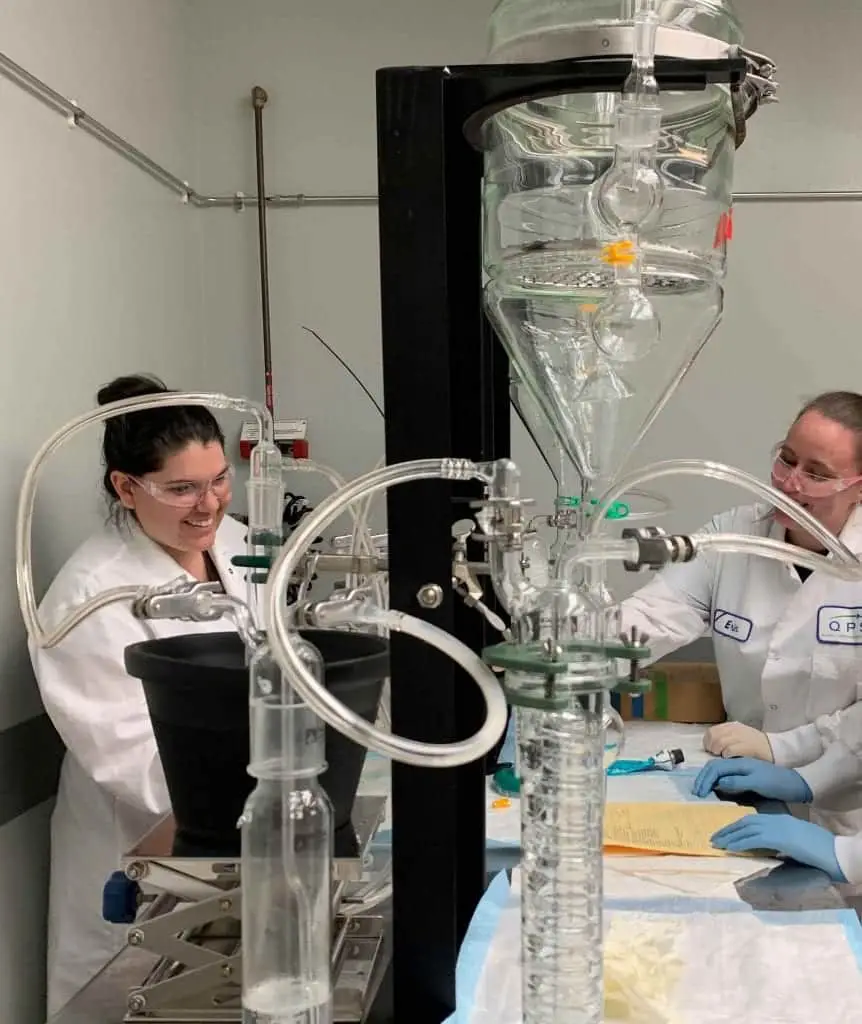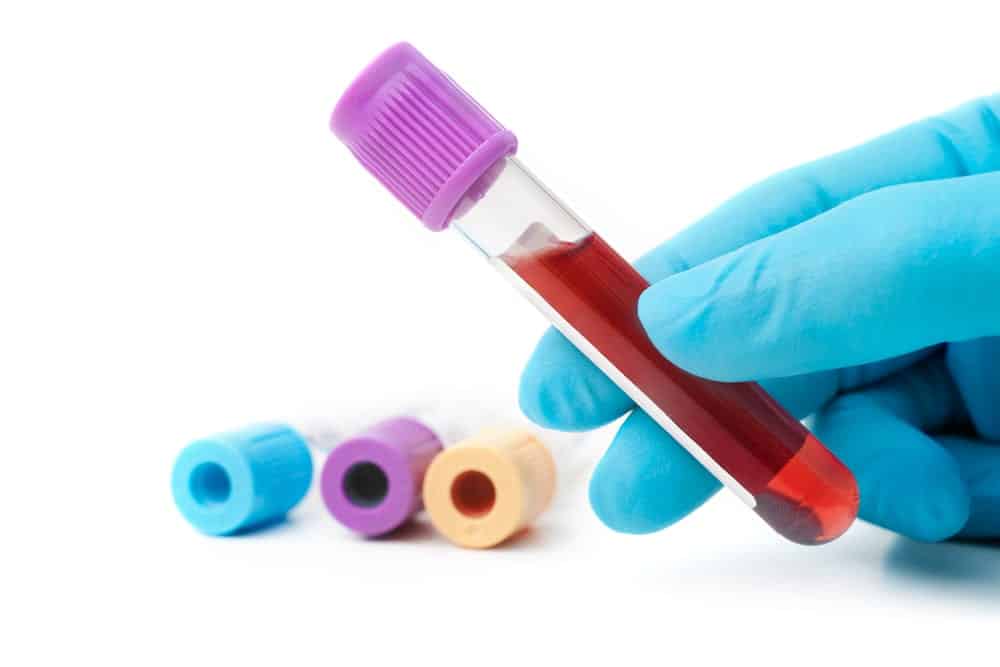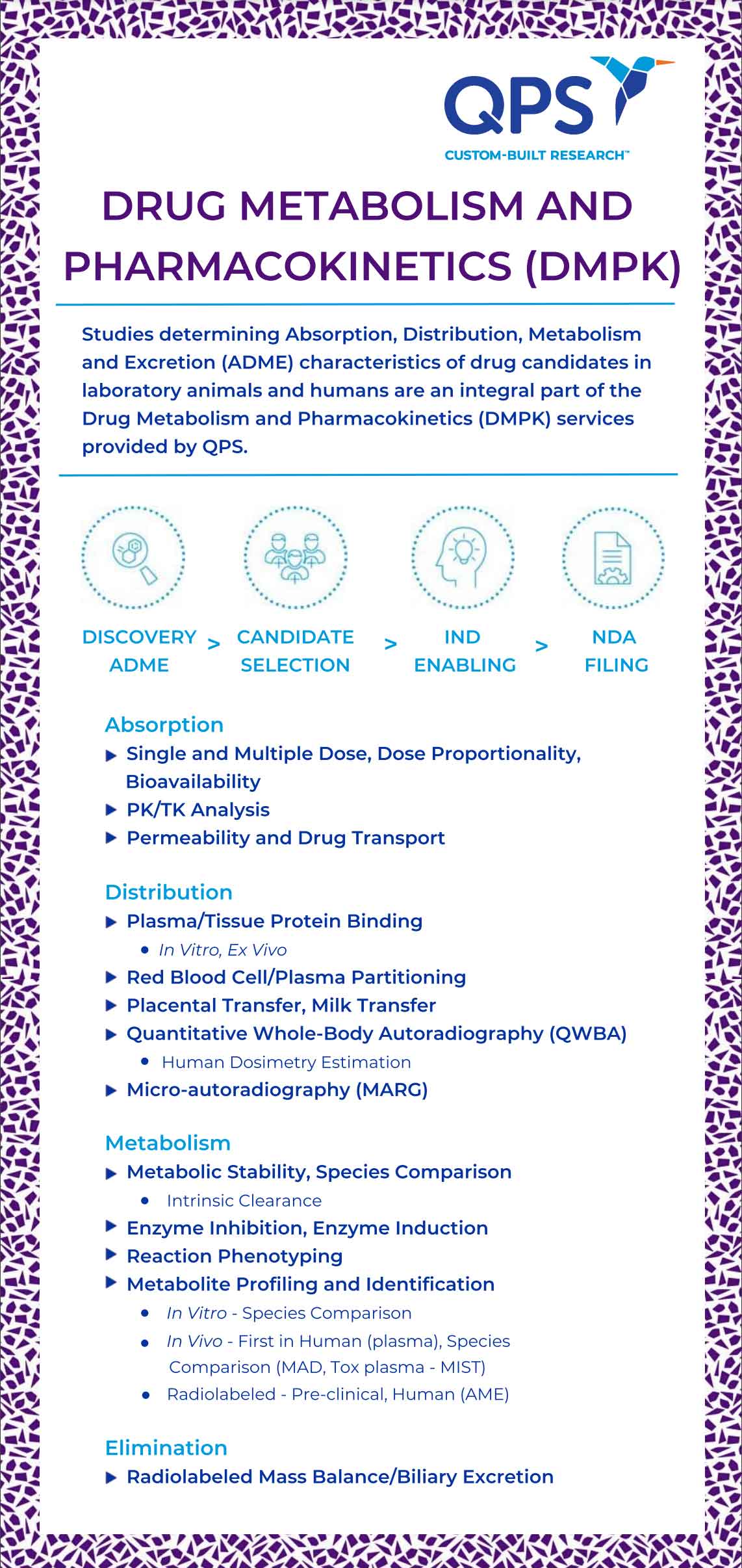DMPK Studies
Designed With Safety In Mind
Studies determining Absorption, Distribution, Metabolism and Excretion (ADME) characteristics of drug candidates in laboratory animals and humans are an integral part of the Drug Metabolism and Pharmacokinetics (DMPK) services provided by QPS. DMPK projects cover a drug development program from the discovery, candidate selection, Investigational New Drug (IND) enabling, through New Drug Application (NDA) stages.
Integrated Scientific Team
Our DMPK research team consists of multiple areas of subject matter experts focused on high scientific excellence in design with solid technical execution. With their extensive industrial experience in drug discovery and development, our passionate scientists can assist in a timely fashion with study design, study planning, and execution, as well as data interpretation and report writing. We strive to be flexible, understanding each program’s unique merits to effectively design DMPK research studies and interpret results. Our state-of-the-art instruments are completely supported by a dedicated technical team, ensuring that our data maintains high scientific standards.
Dedicated Bioanalytical Support
From the very beginning, QPS’s strong expertise in bioanalysis has provided a solid foundation for DMPK services. We have a dedicated bioanalytical group within the DMPK department with dedicated bioanalytical instruments to support all DMPK projects and streamline the process. This team works closely with the bioanalytical department; the two groups complement each other’s strengths and facilitate the progress of drug candidates moving from discovery through development stages.
Optimized Process to Increase Capacity
An essential component of drug discovery and development is time. During our early QPS years, we focused on large programs of multiple compounds on a regular basis. We improved and optimized our process and efficiency to increase our capacity. We applied this process optimization throughout all DMPK services we provided. As our focus moves towards selective candidates for IND submission and beyond, we are able to organize our expertise in different areas and deliver the data package efficiently.
ADME Data Package Supports IND Submission
QPS supports a whole range of studies for drug development including radiolabeled mass balance studies, comprehensive biotransformation, Quantitative Whole-Body Autoradiography (QWBA) studies, and a host of in vitro and DDI assessment studies. Completion of all the preclinical DMPK studies, coupled with clinical PK, will provide an ADME data package that will fully support regulatory IND and NDA submission.

Biotransformation Studies are Essential
Among QPS studies to support discovery and development of new drug candidates are the following:
- in vitro metabolic stability in hepatic subcellular fractions to determine intrinsic clearance
- in vitro comparison of metabolite formation in animal and human hepatic preparations, using non-labeled and radio-labeled test articles
- in vivo metabolite profiling, identification using samples collected from PK
- Definitive in vivo metabolite profiling, identification, and quantification using samples from mass balance excretion studies in preclinical species and human AME studies
Metabolites In Safety Testing (MIST)
- Evaluation of existence of human major metabolite and disproportionate metabolite(s)
- Assessment of coverage of human major metabolites by the toxicity species
Autoradiography, Human Dosimetry, and Micro Autoradiography (MARG)
Quantitative Whole-Body Autoradiography (QWBA)
In addition to providing tissue concentrations for human dosimetry prediction, which is required for human AME study, QWBA offers unique tools for investigating tissue pharmacokinetics, efficacy, toxicology, drug delivery, and disposition.
Micro-Autoradiography (MARG)
Micro-autoradiography is a useful tool for visualizing the cellular localization of radiolabeled material within a tissue of interest.

Protein Binding in Plasma, AAG, HSA, and Tissues
- Use ultrafiltration, equilibrium dialysis, or ultracentrifugation.
- Determine the extent of binding to proteins (in vitro and ex vivo) using non-radiolabeled and radiolabeled compound.
- Frequent encountered issues – non-specific binding, compound stability, extremely high binding, etc.
- In vitro blood partitioning to understand the distribution of compound between red blood cells and plasma.
Drug-Drug Interaction Studies
QPS provides drug-drug interaction studies to determine the potential of a substance to alter cytochrome P450 (CYP450) and non-CYP activities. Studies conducted to assess inhibition and induction potential drug metabolizing enzymes to support discovery and development of new drug candidates include the following:
Reaction Phenotyping
- Reaction phenotyping for the identification of enzymes including CYP and UGT involved in the metabolism of a compound using liver microsomes and recombinant enzymes. Determine kinetic parameters, Km, Vmax and Clint.
Inhibition
- In vitro inhibition characterization CYP enzymes in human liver microsomes or hepatocytes to determine reversible or irreversible IC50.
- In vitro mechanistic characterization of reversible inhibitory rate constants Ki.
- Identify the reversible mechanism of inhibition as competitive, non-competitive or uncompetitive.
- In vitro mechanistic characterization of time dependent inhibition kinact/KI.
- Identify the mechanism of time dependent inhibition as metabolite mediated via covalent modification or due to tight binding effect of substrate.
Induction
In vitro characterization of CYP1A2, CYP2B6, CYP3A4, and CYP2Cs induction potential in human hepatocytes based on mRNA level and/or CYP catalytic activity using isoform selective probe substrates.
Drug Permeability and Transporters
- QPS provides a wide range of services using different in vitro models. Our transporter assays are up to date, adhering to the latest regulatory guidelines and emerging scientific interests. Permeability assay by efflux transporters in MDCKII-MDR1, MDCKII-BCRP, and MDCKII-Wild type cells.
- Uptake assay by Solute Carrier (SLC) Transporters in HEK293 cells.
- Vesicle assays in both efflux and SLC transporters.
Toxicokinetic Analysis and Report (and SEND file preparation)
- Determination of toxicokinetic (TK) parameters using WinNonlin
-
Ratios for comparing exposures across multiple factors:
Gender Ratios
Accumulation
Dose proportionality
Parent/Metabolite or Maternal/Fetal Ratios -
Preparation of the “Standard for Exchange of Nonclinical Data” or “SEND” File
PP Domain with PoolID (for sparse datasets)
Validation report using Pinnacle 21
Study Data Reviewer’s Guide (SDRG)
Discover Screening
QPS offers discovery screening as part of the drug candidate selection process.
- Metabolic stability (identify hot spot; estimate intrinsic clearance)
- Plasma protein binding in rodent and/or human
- In vitro cytochrome p450 (cyp450) inhibition in human liver microsomes
- Rodent pharmacokinetics
- Preliminary assessment of formulations





